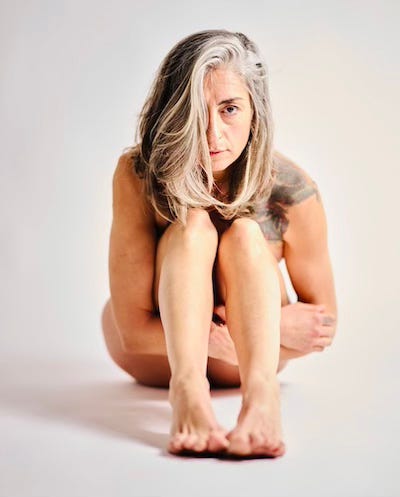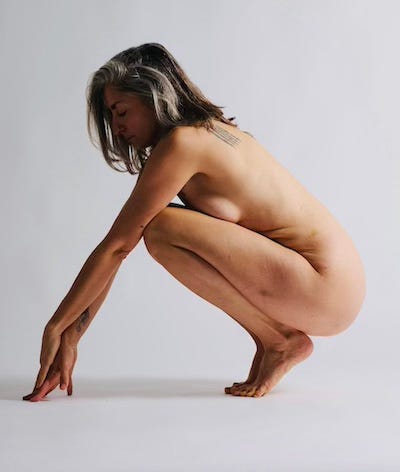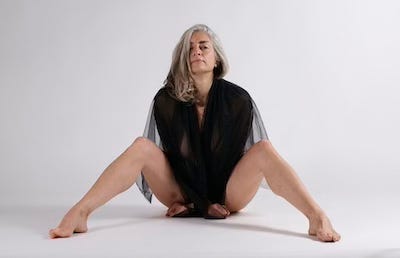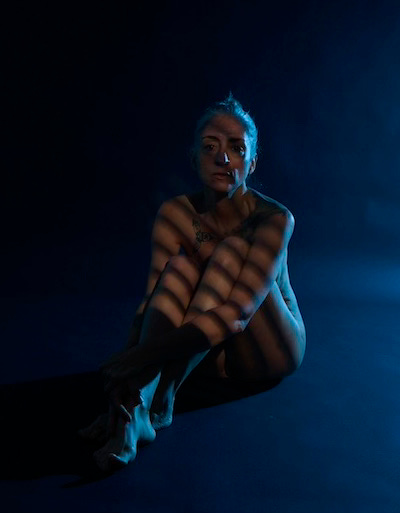“The one person who will never leave us, whom we will never lose, is ourself. Learning to love our female selves is where our search for love must begin.” ~ Bell Hooks

I recently watched The Outrun (2024) - it’s a heart-wrenching story about a young woman struggling with alcoholism and depression, her return home to a rural and intimidating Orkney (an archipelago off the north coast of mainland Scotland), and her painful journey through healing and recovery. In the movie, there is a brief mention of the old Scottish folktale of the Selkies - the shapeshifting creatures that can transform from a seal into a human. While they are in the water, they look just like seals and do whatever the seals do. However, these creatures have power to take off their sealskins and walk to the shore looking like humans. The catch, however, is that if they would lose their sealskin for any reason they would be trapped on land as humans. There are a few varieties in details from story to story, but one thing that is always present is that the Selkies are captivating and beautiful while in their human form. As such, they are always mesmerizing to humans, but these relationships between the Selkies and humans rarely end well.
One of the most popular Selkie stories is the one about the Selkie wife. It speaks of a young man who one night observed a group of Selkies dancing on the beach in the moonlight. There was one Selkie in particular that he liked very much. When they were done dancing, Selkies started putting on their sealskin and, one by one, disappeared in the waves. The enchanting girl was the last one to transition but before she got to her skin, the young man took it and she was forced to go with him, stay in her human form, and become his wife. The life went on, the couple had children - all the while, her sealskin was hidden away somewhere. Until one day, her son found it buried away where no one would find it. The Selkie wife loved her children very much, but the call of the sea was loud and bigger than the love for her children. The husband would never see her again, but the story says that whenever the children were by the shoreline, there would always be one curious seal in the distance watching them.
“And at once you could tell she wanted to stay with her child, she wanted to, but something called her, something older than she, older than he, older than time” ~ Dr. Clarissa Pinkola Estés, Women Who Run with the Wolves

This story is about a yearning for the part of ourselves that we feel we have lost, or maybe a part of ourselves we have once had but no longer is with us, or just maybe a part of ourselves we never dared to acknowledge, to show and integrate. It’s about coming back home, and the instinctual call of our soul. Sometimes, we (especially women) are afraid that others won’t understand our need for return home, our need for a sense of belonging and rootedness, our need to own our center and not give it away. And, it’s true, many may not. Many won’t understand. But the price to pay when we overstay is too high. We need to know when we need to return home.
“These Selkie tales resonate strongly with women, for the Selkie’s song is our song. It is a song of yearning – yearning for a part of ourselves that we feel we have lost – or maybe a part that we feel we might once have had, but never know………The Selkie story is a story of a woman who breaks. Taken literally out of her element, trapped on the land, where she cannot find a way to belong. She has lost her place in the world, and consequently lost her stories. Like the Selkie, so many of us lose our skins, and all too often we lose them early. This can happen in so many ways: it might be stolen by another who does us harm; we might give it away to someone we trust, who then betrays us; or we might hide it for safekeeping and then forget where we hid it”. ~ Sharon Blackie, If Women Rose Rooted
Women go home in many different ways. For some it is through very earthly ways, and for others through divine practices. For some it is with poetry, for others in communing with nature, and for many it is when they are intimate with a partner. What these ways all have in common is that when home, we feel in one piece, we self-reflect, we grow, we transform. In order to heal, women need to reconnect with themselves and their desires, with other women, and with their wild instinct and nature. We need the inner world and fantasy, we need to cultivate our sense of one’s self and be at peace with it, and we need an uninterrupted contact with the sacred and divine (no matter what that looks like for us individually). For me, true going home happened when I discovered my BDSM and kink community, and found my place in this - for many - unfamiliar world.

At first, when I joined the community, I wasn’t sure what I liked and what I disliked - mostly because I spent a significant time in my life focusing on what others liked when it comes to sex, relationships and intimacy. I wasn’t sure what I was interested in trying and what was a turnoff for me. I was out there floating, just trying out different things, and making sure I am safe and sane. Some people and things were right for me, while others weren’t. Some things I needed to try a few times so I can really know how I felt about them. And some people I simply had to encounter and experience in order to learn what not to do again, and whom not to associate with again. There is one thing I never needed to question, though - and that is my role as a submissive. It came so naturally to me, so instinctively, and without any doubt or hesitation. It felt like coming home to a familiar, safe place.
If it’s true that one thing that all women want is sovereignty, then I certainly got mine through my submission. I am aware that this may sound very contradictory to many of you; let me explain. Sovereignty, when it comes to women, is about many things, but for the purpose of this post, it is primarily about our right to bodily autonomy and sovereign sexuality. This means that we (women) have the ultimate power and right to establish connection with our bodies in whatever way we see fit, to do with our bodies what we please and what we believe is right, to speak up and communicate our boundaries, to consent, and to take action on our own behalf - without asking for permission and without a fear of being judged, criticized, discriminated against, marginalized, or violated in any way. Therefore, what I choose to practice and do with my body is my personal choice, my birth right and my own business. And, I personally get a lot of empowerment and experience healing from being a submissive in adult, respectful, caring, loving consensual relationships.

The duality of women’s life - the one of mothering or family obligations vs her own inner life - has never exactly been the duality that I could personally relate to. I am not a mother and I don’t have family obligations of any kind. However, the duality of being perceived as an angel or a whore I certainly have experienced as a woman who grew up in the patriarchy and a machismo culture. I remember that, for the longest time in my very young age, I have tried to play a role of an angel through being a good, nice, easy, low maintenance girlfriend, putting the needs of my partners before my own (not because I genuinely felt it but because I felt I am supposed to be doing that), without my own sexual desires but rather with a desire to please them (and with this, I often wouldn’t ask for what I want). All this time, however, deep inside I was something else - aspiring to so much more in life, with feelings and opinions of my own, often loud and ungraceful, with a freedom of expression and a passionate nature, hungry for novelty and exploration, and certainly an extremely sensuous creature. All this would often make me a whore.
Since I was very young, and very early in dating and relationships, I would develop this feeling whenever men would admire me or worship me too quickly, when they would be overly sweet around me or very soft with me (mostly because they wanted something from me), or when they would be too much into me too soon and without knowing the “real” me… I found all that uncomfortable to say the least - if not disgusting and repulsive. It is very clear to me that being in a Domme role for me is greatly unpleasant, overwhelming and borderline revolting (aside from being super demanding, when all I need is a break from my daily life and responsibilities). On the flip side, when I am in a submissive role, where I am being (sexually) objectified, where I am choosing to serve the other or be treated like an object for someone else’s pleasure - this IS healing, when done with a sane and emotionally available Dominant partner who cares for me, leads with love, and respects my boundaries. If not, this experience could certainly be one that is harming and violating, and this has been often a reality for many women (myself included).

Once again - my personal journey back home has been through kink and BDSM. And, so far, my experience greatly validates the idea that one of my dear teachers shared with me recently; which is that BDSM and kink scenes and practices, can either recreate the trauma or obliterate it. Either way - if it’s HOT, it’s HEALING (as long as you do it as an adult)! And, as paradoxical as it is, we need to heal ourselves in order to be truly free.
If you feel touched in any way by this topic, and you would like to explore how this applies to you and your life, here are some questions for self-reflection (Source: Ignite Well-being):
How does the Selkie myth resonate with you?
What happened to your sealskin (soulskin)? Was it stolen? Lost?
What calls your wild instinct?
Where is Home? And when were you last there? How can you make space in your life to find Home?
If you identify as female, have you been to a women’s circle? – If not, I would encourage you to try at least one; the more, the better, as every circle is as diverse as the group of women attending and the facilitator.
If you identify as male, how does the Selkie myth resonate for you? Is it a false distinction to make this story emphasize the feminine?
If you are not a parent or caregiver, how does the selkie myth and healer archetype show up in your life?

Thank you for you reading me, following me, liking my posts, commenting on them… and for your subscription!
If you feel inspired, touched or moved,
If you feel seen, heard or understood,
If you find my offerings in any way relatable, insightful or useful,
Feel free to offer me a tip - PayPal me or Venmo me at Makikat.
You can also upgrade your subscription to a paid membership anytime.
Until we meet again,
Marina




@Juniper Lynn Tartaglia thank you so much for restacking me, and for your support! I am glad you liked the Selkies 🖤✨
I thought the Selkie story and metaphor was beautiful and poignant. It evoked in me the calling home and the lost self I felt in both marriage and motherhood, particularly when my children were small and had big needs.
Given where my mind was with the Selkie myth, I was surprised by the next subject. It took me a minute, but I did get to where you were taking us.
I relate to your coming home and finding healing through submission in that I briefly got involved with a Dom. I didn’t participate in a scene, but we talked contract and had a lot of discussion about this seemingly paradoxical position of power through submitting. I ultimately found him to be an unsafe person but it opened my eyes to the BDSM kink world & the potential & possibility for deep intimacy and healing.
Thought provoking & Fascinating read.